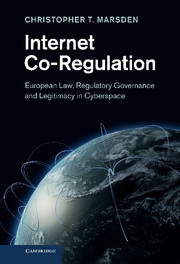Book contents
- Frontmatter
- Contents
- Acknowledgements
- Abbreviations
- Table of legislation
- 1 States, firms and legitimacy of regulation: insoluble issues?
- 2 Internet co-regulation and constitutionalism
- 3 Self-organization and social networks
- 4 An empire entire of itself? Standards, domain names and government
- 5 Content regulation and the Internet
- 6 Private ISP censorship
- 7 Analyzing case studies
- 8 Internet co-regulation as part of the broader regulatory debate
- Bibliography
- Index
2 - Internet co-regulation and constitutionalism
Published online by Cambridge University Press: 07 September 2011
- Frontmatter
- Contents
- Acknowledgements
- Abbreviations
- Table of legislation
- 1 States, firms and legitimacy of regulation: insoluble issues?
- 2 Internet co-regulation and constitutionalism
- 3 Self-organization and social networks
- 4 An empire entire of itself? Standards, domain names and government
- 5 Content regulation and the Internet
- 6 Private ISP censorship
- 7 Analyzing case studies
- 8 Internet co-regulation as part of the broader regulatory debate
- Bibliography
- Index
Summary
Introduction
The term ‘co-regulation’ encompasses a range of different regulatory phenomena, which have in common the fact that the regulatory regime is made up of a complex interaction of general legislation and a self-regulatory body. The varying interests of actors result in different incentives to cooperate or attempt unilateral actions at the various points of the value chain. Without regulation responsive to both the market and the need for constitutional protection of freedom of expression and protection of minors at national levels, Internet co- and self-regulatory measures cannot be sufficiently responsive to economic and cultural environments to be self-sustaining. It has enriched conceptions of ‘soft law’ or ‘governance’ in the literature in the past ten years, but like those umbrella terms, refers to forms of hybrid regulation that do not meet the administrative and statute-based legitimacy of regulation, yet clearly perform some elements of public policy that cannot be ascribed to self-regulation, in the absence of the nation-state or European law. It is often identified with the rise of the ‘new governance’ in the late 1990s in environmental and financial regulation, yet its growth can also be traced to the birth of Information Society policy in the mid 1990s.
- Type
- Chapter
- Information
- Internet Co-RegulationEuropean Law, Regulatory Governance and Legitimacy in Cyberspace, pp. 46 - 70Publisher: Cambridge University PressPrint publication year: 2011
- 3
- Cited by

